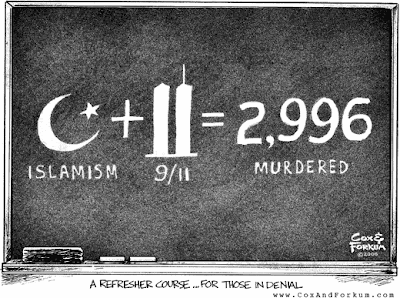Wake Me Up, When September Ends
For those who have been following politics in the US the past few weeks, the phrase “Ground Zero mosque” has been thrown around quite a bit. Conservatives and Republicans have been using the phrase to refer to a planned Islamic Cultural Center which will be built two blocks away from the edge of Ground Zero in an abandoned Burlington Coat Factory. These cries to prevent the building of this cultural center are joined by protests throughout the US in cities big and small where people are trying to prevent Muslims from building mosques or cultural centers.
The angry rhetoric is mixed and contradictory to say the least. Some would claim that two blocks away is simply too close to such a sacred site. Even if the Constitutions gives them the right to do it, they shouldn’t, and for them to force it upon the US is in bad taste, like salt in the wound. Here’s two things wrong with these arguments: 1.If the site is truly sacred then why are these Conservatives not moving to get rid of all the strip clubs nearby or other sites they might find in “bad taste?” 2. The argument against the cultural center works only if you believe that all Muslims are terrorists or that there is something fundamentally “terrorist” about them. If we follow this logic even further you come to the eternal question of whether the actions of a few should stigmatize or define a larger group. In a recent episode of The Daily Show with Jon Stewart, they drew a parallel saying that given historical circumstances, the Catholic Church has a right to build churches near playgrounds, but is it really such a good idea?
Eventually this madness culminated in the plans of a pastor in Florida to celebrate/commemorate 9/11 this year by burning copies of the Qur’an or Islamic holy book. This past week, after even General Petraeus who is currently leading the US war effort in Afghanistan said that it was a terrible idea which would make his job there far more difficult, the pastor called it off.
One of the band Green Day’s more poignant songs is “Wake Me Up, When September Ends” and in the 9 years since the 9/11 attacks, as I’ve seen the ways in which Republicans have used the tragedy to win elections and how the worst parts of blind American patriotism and jingoism can emerge around this time of the year, I’ve sometimes felt like that song was absolutely right. It is as infuriating as it is sad to watch ya maolekña na bei maigo’ ha’, ya’hu yu’ an makpo’ este!
But interestingly enough, the notion of being woken up in September holds a very different meaning for me as well, because when people ask me how I became a “radical” or a “political person” I often point to the 9/11 attacks as a moment which helped open my eyes to the world and most importantly to the nature of colonialism on Guam.
September 11th actually happened (for the most part) on September 12th on Guam, and during the course of that day I remember classes being cancelled, people glued to television sets and conversations everywhere about what had happened and what was going to happen.
As I listened to the media from the states I constantly heard “Pearl Harbor” as the metaphor through which people were trying to make sense of what had happened. The attacks pierced the wishful innocence and isolation of the US. The world had felt so tranquil and so well-understood before, but like in 1941, the attacks seemed to shatter all that, leaving people bewildered and angry. Since most people in the US don’t know much about their own history or their history of doing things to other people around the world, the 9/11 attacks felt like a “surprise” attack, but in truth a bubble of American innocence had been burst. As people turned to history for answers, sadly most actually weren’t looking for an historical explanation, because the US history of interventions in the Middle East would not inspire much patriotism, but simply wanted to find a way of protecting that feeling of everything being so tranquil before. Pearl Harbor seemed to do the trick.
Even on Guam, I heard Chamorros, young and old, describe their own feelings of shock and vulnerability through the idea of “Pearl Harbor.” This, despite as everyone on Guam should know, Guam was attacked by the Japanese in 1941, just a few hours after Hawai’i was. At that point in my life I had already made a choice that one of the things I wanted to be was a Guam historian. As such I couldn’t help but be appalled when I heard people on Guam speak like that. In that moment when they were trying to articulate intimate feelings of being lost, attacked, confused by this attack which had appeared to come out of nowhere, they did not refer to something local, something which they could literally be genetically tied to, something which every Chamorro on Guam at that time went through. Instead they imported a memory from a larger national imagination, and ended up erasing that local meaning, or worse yet making it so that the invasion of Guam was just a footnote to the attack at Pearl Harbor and not something to be recognized on its own.
I’ve learned plenty of lessons in how colonialism can affect a people since then, but each September my mind is drawn back to that initial lesson.






Comments